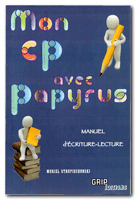 JohnMédiateur
JohnMédiateur
http://www.nytimes.com/2011/09/04/technology/technology-in-schools-faces-questions-on-value.html?_r=1&pagewanted=all
Extrait :
The class, and the Kyrene School District as a whole, offer what some see as a utopian vision of education’s future. Classrooms are decked out with laptops, big interactive screens and software that drills students on every basic subject. Under a ballot initiative approved in 2005, the district has invested roughly $33 million in such technologies.
The digital push here aims to go far beyond gadgets to transform the very nature of the classroom, turning the teacher into a guide instead of a lecturer, wandering among students who learn at their own pace on Internet-connected devices.
“This is such a dynamic class,” Ms. Furman says of her 21st-century classroom. “I really hope it works.”
Hope and enthusiasm are soaring here. But not test scores.
Since 2005, scores in reading and math have stagnated in Kyrene, even as statewide scores have risen.
To be sure, test scores can go up or down for many reasons. But to many education experts, something is not adding up — here and across the country. In a nutshell: schools are spending billions on technology, even as they cut budgets and lay off teachers, with little proof that this approach is improving basic learning.
This conundrum calls into question one of the most significant contemporary educational movements. Advocates for giving schools a major technological upgrade — which include powerful educators, Silicon Valley titans and White House appointees — say digital devices let students learn at their own pace, teach skills needed in a modern economy and hold the attention of a generation weaned on gadgets.
Some backers of this idea say standardized tests, the most widely used measure of student performance, don’t capture the breadth of skills that computers can help develop. But they also concede that for now there is no better way to gauge the educational value of expensive technology investments.
“The data is pretty weak. It’s very difficult when we’re pressed to come up with convincing data,” said Tom Vander Ark, the former executive director for education at the Bill and Melinda Gates Foundation and an investor in educational technology companies. When it comes to showing results, he said, “We better put up or shut up.”
And yet, in virtually the same breath, he said change of a historic magnitude is inevitably coming to classrooms this decade: “It’s one of the three or four biggest things happening in the world today.”
Critics counter that, absent clear proof, schools are being motivated by a blind faith in technology and an overemphasis on digital skills — like using PowerPoint and multimedia tools — at the expense of math, reading and writing fundamentals. They say the technology advocates have it backward when they press to upgrade first and ask questions later.
The spending push comes as schools face tough financial choices. In Kyrene, for example, even as technology spending has grown, the rest of the district’s budget has shrunk, leading to bigger classes and fewer periods of music, art and physical education.
At the same time, the district’s use of technology has earned it widespread praise. It is upheld as a model of success by the National School Boards Association, which in 2008 organized a visit by 100 educators from 17 states who came to see how the district was innovating.
And the district has banked its future and reputation on technology. Kyrene, which serves 18,000 kindergarten to eighth-grade students, mostly from the cities of Tempe, Phoenix and Chandler, uses its computer-centric classes as a way to attract children from around the region, shoring up enrollment as its local student population shrinks. More students mean more state dollars.
The issue of tech investment will reach a critical point in November. The district plans to go back to local voters for approval of $46.3 million more in taxes over seven years to allow it to keep investing in technology. That represents around 3.5 percent of the district’s annual spending, five times what it spends on textbooks.
The district leaders’ position is that technology has inspired students and helped them grow, but that there is no good way to quantify those achievements — putting them in a tough spot with voters deciding whether to bankroll this approach again.
“My gut is telling me we’ve had growth,” said David K. Schauer, the superintendent here. “But we have to have some measure that is valid, and we don’t have that.”
It gives him pause.
“We’ve jumped on bandwagons for different eras without knowing fully what we’re doing. This might just be the new bandwagon,” he said. “I hope not.”
A Dearth of Proof
The pressure to push technology into the classroom without proof of its value has deep roots.
Extrait :
The class, and the Kyrene School District as a whole, offer what some see as a utopian vision of education’s future. Classrooms are decked out with laptops, big interactive screens and software that drills students on every basic subject. Under a ballot initiative approved in 2005, the district has invested roughly $33 million in such technologies.
The digital push here aims to go far beyond gadgets to transform the very nature of the classroom, turning the teacher into a guide instead of a lecturer, wandering among students who learn at their own pace on Internet-connected devices.
“This is such a dynamic class,” Ms. Furman says of her 21st-century classroom. “I really hope it works.”
Hope and enthusiasm are soaring here. But not test scores.
Since 2005, scores in reading and math have stagnated in Kyrene, even as statewide scores have risen.
To be sure, test scores can go up or down for many reasons. But to many education experts, something is not adding up — here and across the country. In a nutshell: schools are spending billions on technology, even as they cut budgets and lay off teachers, with little proof that this approach is improving basic learning.
This conundrum calls into question one of the most significant contemporary educational movements. Advocates for giving schools a major technological upgrade — which include powerful educators, Silicon Valley titans and White House appointees — say digital devices let students learn at their own pace, teach skills needed in a modern economy and hold the attention of a generation weaned on gadgets.
Some backers of this idea say standardized tests, the most widely used measure of student performance, don’t capture the breadth of skills that computers can help develop. But they also concede that for now there is no better way to gauge the educational value of expensive technology investments.
“The data is pretty weak. It’s very difficult when we’re pressed to come up with convincing data,” said Tom Vander Ark, the former executive director for education at the Bill and Melinda Gates Foundation and an investor in educational technology companies. When it comes to showing results, he said, “We better put up or shut up.”
And yet, in virtually the same breath, he said change of a historic magnitude is inevitably coming to classrooms this decade: “It’s one of the three or four biggest things happening in the world today.”
Critics counter that, absent clear proof, schools are being motivated by a blind faith in technology and an overemphasis on digital skills — like using PowerPoint and multimedia tools — at the expense of math, reading and writing fundamentals. They say the technology advocates have it backward when they press to upgrade first and ask questions later.
The spending push comes as schools face tough financial choices. In Kyrene, for example, even as technology spending has grown, the rest of the district’s budget has shrunk, leading to bigger classes and fewer periods of music, art and physical education.
At the same time, the district’s use of technology has earned it widespread praise. It is upheld as a model of success by the National School Boards Association, which in 2008 organized a visit by 100 educators from 17 states who came to see how the district was innovating.
And the district has banked its future and reputation on technology. Kyrene, which serves 18,000 kindergarten to eighth-grade students, mostly from the cities of Tempe, Phoenix and Chandler, uses its computer-centric classes as a way to attract children from around the region, shoring up enrollment as its local student population shrinks. More students mean more state dollars.
The issue of tech investment will reach a critical point in November. The district plans to go back to local voters for approval of $46.3 million more in taxes over seven years to allow it to keep investing in technology. That represents around 3.5 percent of the district’s annual spending, five times what it spends on textbooks.
The district leaders’ position is that technology has inspired students and helped them grow, but that there is no good way to quantify those achievements — putting them in a tough spot with voters deciding whether to bankroll this approach again.
“My gut is telling me we’ve had growth,” said David K. Schauer, the superintendent here. “But we have to have some measure that is valid, and we don’t have that.”
It gives him pause.
“We’ve jumped on bandwagons for different eras without knowing fully what we’re doing. This might just be the new bandwagon,” he said. “I hope not.”
A Dearth of Proof
The pressure to push technology into the classroom without proof of its value has deep roots.
_________________
En achetant des articles au lien ci-dessous, vous nous aidez, sans frais, à gérer le forum. Merci !
"Qui a construit Thèbes aux sept portes ? Dans les livres, on donne les noms des Rois. Les Rois ont-ils traîné les blocs de pierre ? [...] Quand la Muraille de Chine fut terminée, Où allèrent ce soir-là les maçons ?" (Brecht)
"La nostalgie, c'est plus ce que c'était" (Simone Signoret)
 Julie PieNiveau 6
Julie PieNiveau 6
Je ne lis pas l'anglais... mais bon chez nous, il semble que certains ont déjà la réponse:
A l’occasion du colloque "Le numérique, moteur du changement", organisé par l’Institut Edgar Quinet, le 30 mars, Vincent Peillon a annoncé "un grand plan e-education" en cas de victoire de François Hollande.
"Nous devons porter une très grande ambition pour la e-education", a déclaré Vincent Peillon, responsable éducation de François Hollande, le 30 mars. "Nous devons changer d’échelle". Il a rappelé le "retard français" en équipement principalement au primaire et dans les usages estimant que l’école doit "préparer au monde de demain". Il a promis "un grand plan pour la e-education" afin de réformer les méthodes pédagogiques et de lutter contre l’échec scolaire et développer l’autonomie des élèves. Son programme s’articule en 5 points.
(…)
http://www.prisme-asso.org/spip.php?article4858
A l’occasion du colloque "Le numérique, moteur du changement", organisé par l’Institut Edgar Quinet, le 30 mars, Vincent Peillon a annoncé "un grand plan e-education" en cas de victoire de François Hollande.
"Nous devons porter une très grande ambition pour la e-education", a déclaré Vincent Peillon, responsable éducation de François Hollande, le 30 mars. "Nous devons changer d’échelle". Il a rappelé le "retard français" en équipement principalement au primaire et dans les usages estimant que l’école doit "préparer au monde de demain". Il a promis "un grand plan pour la e-education" afin de réformer les méthodes pédagogiques et de lutter contre l’échec scolaire et développer l’autonomie des élèves. Son programme s’articule en 5 points.
(…)
http://www.prisme-asso.org/spip.php?article4858
 RoninMonarque
RoninMonarque
Moi je pense qu'un plan sur la lecture serait moins cher et 100 fois plus efficace mais bon je dois sans doute être trop bête, pas assez moderne, bref un facho. Des illettrés branchés sur le net c'est sûr ce sera moderne.
_________________

 gelsomina31Grand Maître
gelsomina31Grand Maître
Ronin a écrit:Moi je pense qu'un plan sur la lecture serait moins cher et 100 fois plus efficace mais bon je dois sans doute être trop bête, pas assez moderne, bref un facho. Des illettrés branchés sur le net c'est sûr ce sera moderne.

 doublecasquetteEnchanteur
doublecasquetteEnchanteur
gelsomina31 a écrit:Ronin a écrit:Moi je pense qu'un plan sur la lecture serait moins cher et 100 fois plus efficace mais bon je dois sans doute être trop bête, pas assez moderne, bref un facho. Des illettrés branchés sur le net c'est sûr ce sera moderne.
Et moi, je pense que pas de plan du tout, mais une solide formation des enseignants à instruire les élèves, ce serait l'idéal !
Des plans sur la lecture, on en a déjà eu des tas depuis Foucambert et son ELMO ! Pour l'instant, ça n'a jamais été bien terrible, quand même !
 RoninMonarque
RoninMonarque
C'est, en plus nuancé, ce que je voulais dire bien sûr...  vous aviez saisi l'idée je pense.
vous aviez saisi l'idée je pense.
 vous aviez saisi l'idée je pense.
vous aviez saisi l'idée je pense. ClarinetteGrand Maître
ClarinetteGrand Maître
Nooooon, plus de plan !  Pitié !
Pitié !  Laissez-nous bosser !
Laissez-nous bosser !
Pour John, en remplaçant "danser" et "chanter" par "bosser" !
 Pitié !
Pitié !  Laissez-nous bosser !
Laissez-nous bosser ! Pour John, en remplaçant "danser" et "chanter" par "bosser" !

 doublecasquetteEnchanteur
doublecasquetteEnchanteur
Déjà trois voix contre le plan ! Enlevez le plan ! :acc:
 gelsomina31Grand Maître
gelsomina31Grand Maître
4 voix! 

 ArediusNiveau 9
ArediusNiveau 9
Je n'aurais pas du lire ces messages, demain c'est vote !
Ce qui certain c'est que notre balance commerciale va en prendre un sacré coup ! d'où viennent tous ces e-machines ?
Et j'aime bien : on n'a pas de bons résultats parce qu'on a pas le bon instrument de mesure ! ben couillon ! fabriquer l'instrument pour obtenir le bon résultat, ils ne savent pas faire aux States ?
Ce qui certain c'est que notre balance commerciale va en prendre un sacré coup ! d'où viennent tous ces e-machines ?
Et j'aime bien : on n'a pas de bons résultats parce qu'on a pas le bon instrument de mesure ! ben couillon ! fabriquer l'instrument pour obtenir le bon résultat, ils ne savent pas faire aux States ?
_________________
Aredius, Nantes,http://lefenetrou.blogspot.com
"Homo sum et nihil humani a me alienum puto" (Terence)
"Quis custodiet ipsos custodes? " (Juvenal)
 Avril69Neoprof expérimenté
Avril69Neoprof expérimenté
+1 !gelsomina31 a écrit:Ronin a écrit:Moi je pense qu'un plan sur la lecture serait moins cher et 100 fois plus efficace mais bon je dois sans doute être trop bête, pas assez moderne, bref un facho. Des illettrés branchés sur le net c'est sûr ce sera moderne.
 Thalia de GMédiateur
Thalia de GMédiateur
5 voix ! 
Et d'autant plus qu'il faudra d'abord s'occuper de la e-éducation de Madame Thalia de G, laquelle maîtrise à peu près correctement le traitement de textes et la navigation sur neoprofs, mais est loin de tout dominer.
mais est loin de tout dominer. 
Et d'autant plus qu'il faudra d'abord s'occuper de la e-éducation de Madame Thalia de G, laquelle maîtrise à peu près correctement le traitement de textes et la navigation sur neoprofs,

_________________
Le printemps a le parfum poignant de la nostalgie, et l'été un goût de cendres.
Soleil noir de mes mélancolies.
 User5899Demi-dieu
User5899Demi-dieu
Retrait ! Retrait ! Retrait du plan e-duc !
 FrisouilleEnchanteur
FrisouilleEnchanteur
Au-delà de la question pour ou contre le tout TICE  , la question du coût (achat) et de l'entretien (avec des gens formés à ça, en nombre) n'est jamais abordée.
, la question du coût (achat) et de l'entretien (avec des gens formés à ça, en nombre) n'est jamais abordée.
Politique de l'autruche ?
Perso, dans mon étab, les ventilateurs -minimum vital pour que les élèves commencent seulement à penser bosser- sont hors service en une à deux années, à cause de l'humidité. Quid des ordis, TBI et autre manette-trop-géniale que veut nous vendre le chef ?
que veut nous vendre le chef ? 
Alors que des livres, ça s'abîment, mais moins vite que le reste...
Politique de l'autruche ?
Perso, dans mon étab, les ventilateurs -minimum vital pour que les élèves commencent seulement à penser bosser- sont hors service en une à deux années, à cause de l'humidité. Quid des ordis, TBI et autre manette-trop-géniale

Alors que des livres, ça s'abîment, mais moins vite que le reste...

 ArediusNiveau 9
ArediusNiveau 9
Oui, mais des livres ça ne fait pas une bonne photo dans la revue en couleurs du :
- Conseil Général
- Conseil Régional
- et de la Mairie
Le peuple veut voir où passe ses sous.
A chaque changement, D -> G ou G -> D, on a droit à son plan e-machin. Vous vous souvenez quand l'ordinateur allait résoudre les problèmes africains ? JJSS ça vous dit quelque chose ? Nihil nuevi sub sole
- Conseil Général
- Conseil Régional
- et de la Mairie
Le peuple veut voir où passe ses sous.
A chaque changement, D -> G ou G -> D, on a droit à son plan e-machin. Vous vous souvenez quand l'ordinateur allait résoudre les problèmes africains ? JJSS ça vous dit quelque chose ? Nihil nuevi sub sole
_________________
Aredius, Nantes,http://lefenetrou.blogspot.com
"Homo sum et nihil humani a me alienum puto" (Terence)
"Quis custodiet ipsos custodes? " (Juvenal)
 DhaiphiGrand sage
DhaiphiGrand sage
Julie Pie a écrit: Il a promis "un grand plan pour la e-education" afin de réformer les méthodes pédagogiques et de lutter contre l’échec scolaire et développer l’autonomie des élèves.
Mais oui, bien sûr...
 :censure:
:censure: _________________
De toutes les écoles que j’ai fréquentées, c’est l’école buissonnière qui m’a paru la meilleure.
[Anatole France]
J'aime les regretteurs d'hier qui voudraient changer le sens des rivières et retrouver dans la lumière la beauté d'Ava Gardner.
[Alain Souchon]
 MarcassinHabitué du forum
MarcassinHabitué du forum
Merci pour le lien, John.
_________________
"Je regarde la grammaire comme la première partie de l'art de penser." (Condillac)
Permission de ce forum:
Vous ne pouvez pas répondre aux sujets dans ce forum




